Office of the United Nations High Commissioner for Human Rights
 | |
| Abbreviation | OHCHR HCDH |
|---|---|
| Formation | 20 December 1993[1] |
| Type | Agency |
| Legal status | Active |
| Headquarters | Geneva, Switzerland New York City, United States |
Head | Volker Türk, High Commissioner for Human Rights[2] |
| Website | ohchr.org |
The Office of the United Nations High Commissioner for Human Rights[a] (OHCHR) is a department of the United Nations Secretariat that works to promote and protect human rights that are guaranteed under international law and stipulated in the Universal Declaration of Human Rights of 1948. The office was established by the United Nations General Assembly on 20 December 1993[3] in the wake of the 1993 World Conference on Human Rights.
The office is headed by the High Commissioner for Human Rights, who co-ordinates human rights activities throughout the United Nations System and acts as the secretariat of the Human Rights Council in Geneva, Switzerland. The eighth and current High Commissioner is Volker Türk of Austria, who succeeded Michelle Bachelet of Chile on 8 September 2022.[2]
In 2018–2019, the department had a budget of US$201.6 million (3.7 per cent of the United Nations regular budget),[4] and approximately 1,300 employees based in Geneva and New York City.[5] It is an ex officio member of the Committee of the United Nations Development Group.[6]
Functions and organization[edit]
Mandate[edit]

The mandate of OHCHR derives from Articles 1, 13 and 55 of the Charter of the United Nations, the Vienna Declaration and Programme of Action and General Assembly resolution 48/141 of 20 December 1993, by which the Assembly established the post of United Nations High Commissioner for Human Rights.[7] In connection with the programme for reform of the United Nations (A/51/950, para. 79), the OHCHR and the Centre for Human Rights were consolidated into a single OHCHR on 15 September 1997.
Purpose[edit]
The objectives of OHCHR are to:
- Promote universal enjoyment of all human rights by giving practical effect to the will and resolve of the world community as expressed by the United Nations
- Play the leading role on human rights issues and emphasize the importance of human rights at the international and national levels
- Promote international cooperation for human rights
- Stimulate and coordinate action for human rights throughout the United Nations system
- Promote universal ratification and implementation of international standards
- Assist in the development of new norms
- Support human rights organs and treaty monitoring bodies
- Respond to serious violations of human rights
- Undertake preventive human rights action
- Promote the establishment of national human rights infrastructures
- Undertake human rights field activities and operations
- Provide education, information advisory services and technical assistance in the field of human rights
Organization[edit]
The OHCHR is divided into organizational units, as described below. The OHCHR is headed by a High Commissioner with the rank of Under-Secretary-General.
High Commissioner for Human Rights (Under-Secretary-General)[edit]
The United Nations High Commissioner for Human Rights, accountable to the Secretary-General, is responsible for all the activities of the OHCHR, as well as for its administration, and carries out the functions specifically assigned to him or her by the UN General Assembly in its resolution 48/141 of 20 December 1993 and subsequent resolutions of policy-making bodies. He or she advises the Secretary-General on the policies of the United Nations in the area of human rights, ensures that substantive and administrative support is given to the projects, activities, organs and bodies of the human rights programme, represents the Secretary-General at meetings of human rights organs and at other human rights events, and carries out special assignments as decided by the Secretary-General. As well as those human rights that are currently included in legally binding treaties, the High Commissioner also promotes human rights yet to be recognized in international law (such as the adoption of economic, social and cultural rights as a strategic priority, which are not all currently recognized in international legal instruments).[8]
Deputy High Commissioner for Human Rights (Assistant Secretary-General)[edit]
The United Nations High Commissioner for Human Rights, in the performance of his or her activities, is assisted by a Deputy High Commissioner who acts as Officer-in-Charge during the absence of the High Commissioner. In addition, the Deputy High Commissioner carries out specific substantive and administrative assignments as decided by the High Commissioner. The Deputy is accountable to the High Commissioner.
The current Deputy High Commissioner for Human Rights is the Australian national Kate Gilmore.[9]
Assistant Secretary-General for Human Rights (UN Headquarters New York)[edit]
The Assistant Secretary-General for Human Rights (not to be confused with the Deputy High Commissioner, who is also an Assistant Secretary-General) is based in New York City and heads the New York Office of the High Commissioner. The New York Office represents the High Commissioner at United Nations Headquarters in New York and promotes the integration of human rights in policy processes and activities undertaken by inter-governmental and inter-agency bodies at the United Nations.
The post of Assistant Secretary-General for Human Rights was created in 2010, when Ivan Šimonović was appointed to the position.[10] From 2016 to 2019, the position was held by Andrew Gilmour.[11] The current Assistant Secretary-General for Human Rights, since 2020, is Ilze Brands Kehris.[12]
Staff Office of the United Nations High Commissioner for Human Rights[edit]
The Staff Office of the United Nations High Commissioner for Human Rights is headed by a Chief who is accountable to the High Commissioner. The core functions of the Staff Office are to:
- Assist the High Commissioner in the overall direction and supervision of the activities of the human rights programme
- Assist the High Commissioner in the formulation, communication, implementation and evaluation of policies, practices and activities for the promotion and protection of human rights
- Assist the High Commissioner in maintaining relations with Governments, other United Nations agencies and entities, international organizations, regional and national institutions, non-governmental organizations, the private sector and academia
- Assist the High Commissioner in maintaining liaison on policy matters with the Executive Office of the Secretary-General and other relevant offices at Headquarters, as well as with the spokespersons of the Secretary-General at New York City and Geneva and the media
- Carry out fund-raising functions and special projects as assigned by the High Commissioner
- Assist the High Commissioner in developing and maintaining a framework for the management and planning of the activities of the human rights programme and facilitating the development of the overall work programme, and in preparing annual management reports on activities and achievements
- Represent the High Commissioner at meetings and make statements on his or her behalf
Administrative Section[edit]
The Administrative Section is headed by a Chief, Kyle F. Ward, who is accountable to the Deputy High Commissioner. The core functions of the Administrative Section, in addition to those set out in section 7 of Secretary-General's bulletin ST/SGB/1997/5, are to:
- Advise the High Commissioner on the budgetary, financial and personnel matters relating to the human rights programme
- Assist the High Commissioner and appropriate staff in the discharge of their financial, personnel and general administrative responsibilities and administering the associate expert and internship programmes
New York Office[edit]
The New York Office is headed by an Assistant Secretary-General who is accountable to the High Commissioner. The core functions of the New York Office are to:
- Represent the High Commissioner at Headquarters, at meetings of policy-making bodies, with permanent missions of Member States, at interdepartmental and inter-agency meetings, with non-governmental organizations and professional groups, at academic conferences and with the media
- Provide policy advice and recommendations on substantive matters to the High Commissioner
- Supply information and advice on human rights to the Executive Office of the Secretary-General
- Provide substantive support on human rights issues to the General Assembly, the Economic and Social Council and other policy-making bodies established in New York City
- Provide materials and information to the permanent missions, United Nations departments, agencies and programs, non-governmental organizations, the media and others regarding the human rights programme
- Provide support to the High Commissioner and other officials, and to Special Rapporteurs and Special Representatives when on mission in New York City
- Undertake other specific assignments as decided by the High Commissioner
Thematic Engagement, Special Procedures and Right to Development Division[edit]
The Thematic Engagement, Special Procedures and Right to Development Division is headed by a Director who is accountable to the High Commissioner. The core functions of the Division are to:
- Promote and protect the right to development, in particular by:
- Supporting intergovernmental groups of experts on the preparation of the strategy for the right to development
- Assisting in the analysis of the voluntary reports by States to the High Commissioner on the progress and steps taken for the realization of the right to development and on obstacles encountered
- Carrying out research projects on the right to development and preparing substantive outputs for submission to the General Assembly, the Commission on Human Rights and treaty bodies
- Assisting in the substantive preparation of advisory service projects and educational material on the right to development
- Providing substantive analysis and support to the High Commissioner in his or her mandate to enhance system-wide support for the right to development
- Carry out substantive research projects on the whole range of human rights issues of interest to United Nations human rights bodies in accordance with the priorities established by the Vienna Declaration and Programme of Action and resolutions of policy-making bodies
- Support the work of the mandate-holders of the Special Procedures of the Human Rights Council
- Provide substantive services to human rights organs engaged in standard-setting activities
- Prepare documents, reports or draft reports, summaries and synthesis and position papers in response to particular requests, as well as substantive contributions to information materials and publications
- Provide policy analysis, advice and guidance on substantive procedures
- Manage the information services of the human rights programme, including the documentation centre and library, enquiry services and the human rights databases
- Prepare studies on relevant articles of the Charter of the United Nations for the Repertory of Practice of United Nations Organs
Human Rights Council and Treaty Mechanisms Division[edit]
The Human Rights Council and Treaty Mechanisms Division is headed by a Director who is accountable to the High Commissioner. The core functions of the Division are to:
- Plan, prepare and service sessions/meetings of the Human Rights Council, the Advisory Committee and related working groups and of the committees established by human rights treaty bodies and their working groups
- Ensure that substantive support is provided in a timely manner to the human rights treaty body concerned, drawing on the appropriate resources of the human rights programme
- Prepare state party reports for review by the treaty body concerned and follow up on decisions and recommendations
- Prepare or coordinate the preparation and submission of all substantive and other documents and the support from other management units to the activities of treaty bodies serviced, and following up on decisions taken at meetings of those bodies
- Plan, prepare and service sessions of the board of trustees of the United Nations Voluntary Fund for Victims of Torture, and implement relevant decisions
- Process communications submitted to treaty bodies under optional procedures and communications under the procedures established by the Economic and Social Council in its resolution 1503 (XLVIII) of 27 May 1970 and ensuring follow-up
Field Operations and Technical Cooperation Division[edit]
The Field Operations and Technical Cooperation Division is headed by a Director who is accountable to the High Commissioner. The core functions of the Division are to:
- Develop, implement, monitor and evaluate advisory services and technical assistance projects at the request of Governments
- Manage the Voluntary Fund for Technical Cooperation in the Field of Human Rights
- Implement the Plan of Action of the United Nations Decade for Human Rights Education, including the development of information and educational materials;
- Provide substantive and administrative support to human rights fact-finding and investigatory mechanisms, such as special rapporteurs, representatives and experts and working groups mandated by the Commission on Human Rights and/or the Economic and Social Council to deal with specific country situations or phenomena of human rights violations worldwide, as well as the General Assembly's Special Committee to Investigate Israeli Practices Affecting the Human Rights of the Palestinian People and Other Arabs of the Occupied Territories
- Plan, support and evaluate human rights field presences and missions, including the formulation and development of best practices, procedural methodologies and models for all human rights activities in the field
- Manage voluntary funds for human rights field presences
- Manage the United Nations Voluntary Fund on Contemporary Forms of Slavery, United Nations Voluntary Fund for Indigenous Populations and United Nations Voluntary Fund for the International Decade of the World's Indigenous People
(Source: OHCHR Website)
High Commissioners for Human Rights[edit]

| Image | Name | Country | Term | Notes |
|---|---|---|---|---|
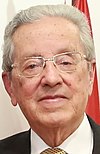 |
José Ayala Lasso | 1994–1997 | ||
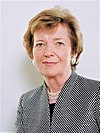 |
Mary Robinson | 1997–2002 | Term was not renewed by Secretary-General Kofi Annan[13] | |
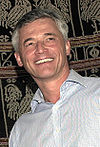 |
Sérgio Vieira de Mello | 2002–2003 | Killed in the Canal Hotel bombing in Baghdad on 19 August 2003[14] | |
| Bertrand Ramcharan | 2003–2004 | Acting High Commissioner | ||
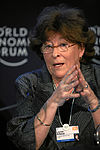 |
Louise Arbour | 2004–2008 | Did not seek a second term[15] | |
 |
Navi Pillay | 1 September 2008 – 31 August 2014 | Her mandate was extended for an additional half term (two years) by the General Assembly on 1 September 2012[16] | |
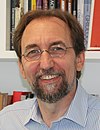 |
Prince Zeid bin Ra'ad bin Zeid al-Hussein | 1 September 2014 – 31 August 2018 | ||
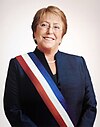 |
Michelle Bachelet | 1 September 2018 – 31 August 2022 | Elected by the General Assembly on 10 August 2018[17] | |
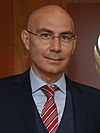 |
Volker Türk | 8 September 2022 – 31 August 2026 | [18] |
Criticisms[edit]
Journalist Emma Reilly leaked e-mails in 2020 and 2021 in which the OHCHR provided names of Chinese participants in UN human rights activities to China on request. This occurred on multiple occasions from before 2012 to at least 2019, despite an explicit ban against this sort of activity. In some cases, after obtaining their name in advance from the UN, the Chinese Communist Party made sure an activist was not able to leave China for Geneva to attend.[19][20][21]
See also[edit]
- United Nations Commission on Human Rights (replaced by Human Rights Council in 2006)
- United Nations Human Rights Council
- United Nations Guiding Principles on Business and Human Rights
Notes[edit]
- ^ Commonly known as the Office of the High Commissioner for Human Rights or the United Nations Human Rights Office.
References[edit]
- ^ "High Commissioner for Human Rights - UN Documentation: Human Rights". Retrieved 5 September 2018.
- ^ a b "OHCHR | High Commissioner". Retrieved 13 September 2022.
- ^ "Brief history". Retrieved 5 September 2018.
- ^ "OHCHR | Funding and Budget". Retrieved 5 September 2018.
- ^ "OHCHR | Who we are". Retrieved 5 September 2018.
- ^ "UNDG Members". Undg.org. Archived from the original on 11 May 2011. Retrieved 10 December 2012.
- ^ "General Assembly resolution 48/141 of 20 December 1993 (A/RES/48/141)". UN document.
- ^ An overview of the United Nations Human Rights system Archived 3 May 2014 at the Wayback Machine; Hogan Lovells International LLP; Advocates for International Development ; 2012; accessed on 27 August 2013
- ^ "Deputy High Commissioner". Ohchr.org. Retrieved 3 December 2013.
- ^ "Ivan Šimonović Secretary-General for Human Rights". Ohchr.org. 17 July 2010. Archived from the original on 25 October 2012. Retrieved 10 December 2012.
- ^ "OHCHR | Andrew Gilmour". ohchr.org. Retrieved 18 December 2018.
- ^ "OHCHR | Ilze Brands Kehris". ohchr.org. Retrieved 5 March 2021.
- ^ Burkeman, Oliver (31 July 2002). "America forced me out, says Robinson". The Guardian. Archived from the original on 26 August 2013. Retrieved 31 October 2008.
- ^ Power, Samantha (2008). Chasing the Flame: One Man's Fight to Save the World. US: Penguin Books. p. 492. ISBN 978-0-14-311485-7.
- ^ United Nations High Commissioner for Human Rights (7 March 2008). Louise Arbour will not be seeking a second term as High Commissioner. Archived 27 May 2013 at the Wayback Machine. Retrieved on 1 September 2008.
- ^ "United Nations High Commissioner for Human Rights, Navi Pillay, to Serve Two More Years, by General Assembly Decision". Un.org. 24 May 2012. Retrieved 10 December 2012.
- ^ "'Pioneering' former Chilean President Michelle Bachelet officially appointed new UN human rights chief". 10 August 2018. Retrieved 5 September 2018.
- ^ "Secretary-General António Guterres on Thursday appointed Volker Türk of Austria as the next United Nations High Commissioner for Human Rights, following approval by the General Assembly". UN News. 8 September 2022. Retrieved 11 September 2022.
- ^ "Leaked emails confirm UN passed info to China in name-sharing scandal". www.aa.com.tr. Retrieved 1 March 2021.
- ^ Evansky, Ben (14 December 2019). "UN Human Rights Office accused of helping China keep an eye on dissidents". Fox News. Retrieved 1 March 2021.
- ^ "UN passed dissidents' info to China, says a UN employee". UN passed dissidents' info to China, says a UN employee. Retrieved 1 March 2021.
Further reading[edit]
- Ramcharan, Bertrand G. (2004). "The United Nations High Commissioner for Human Rights – The Challenges of International Protection". International Studies in Human Rights. 71. Kluwer Publishers.
- Hobbins, A.J. (2001). "Humphrey and the High Commissioner: the Genesis of the Office of the UN High Commissioner for Human Rights". Journal of the History of International Law (III): 38–74. doi:10.1163/15718050120956893.
- de Zayas, Alfred (2002). "Human Rights, United Nations High Commissioner for". In Helmut Volger (ed.). Concise Encyclopedia of the United Nations. Kluwer. pp. 217–223.
- de Zayas, Alfred (2000). "United Nations High Commissioner for Human Rights". In Rudolf Bernhardt (ed.). Encyclopaedia of Public International Law. Vol. IV. Amsterdam: Elsevier. pp. 1129–1132.
- Gaer, Felice D.; Broecker, Christen L., eds. (2013). The United Nations High Commissioner for Human Rights: Conscience for the World. Martinus Nijhoff Publishers. ISBN 978-90-04-25425-1.
External links[edit]
- Official website
- United Nations Rule of Law: The Office of the High Commissioner for Human Rights, on the rule of law work conducted by the Office of the High Commissioner for Human Rights.
